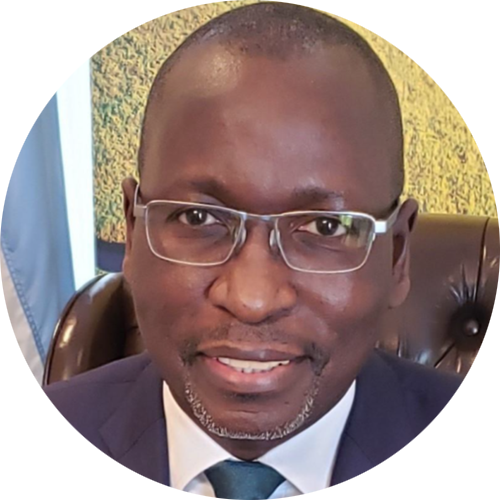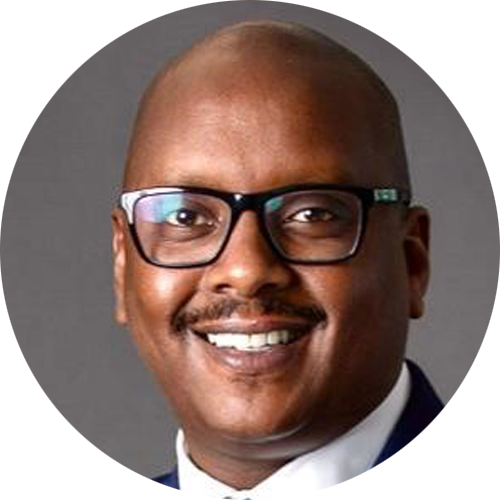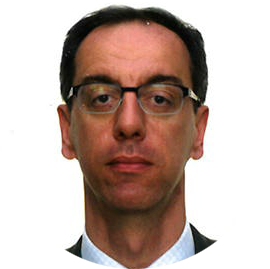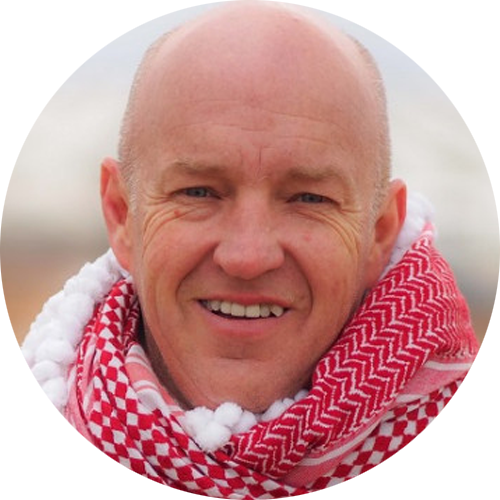The Future of Sustaining Peace Amidst the Climate-Crisis I: The Strategic Perspective
Panel 2 will convene senior policy makers of the United Nations, European Union, and African Union to underline that climate change is an emerging challenge to all aspects of sustaining peace, including sustainable economic and social development, social cohesion, as well as human and environmental security – thereby emphasizing the need for inter-agency and whole-of-system approaches. The panel will further discuss the latest initiatives and challenges in the UN to anchor climate action in the sustaining peace agenda and exchange on how to best mobilize for political momentum and broad Member State support for long-term preventive policy planning beyond electoral cycles. Further topics will be:
- How to mobilize for support to make the topic of climate, peace & stability a core element in the COP process;
- Defining fields in which the UN, EU and AU can strengthen their collaboration at strategic and programmatic levels for integrating a climate-sensitive approach to sustaining peace;
- Developing strategies on how to link climate protection and peacebuilding approaches at strategic, programmatic, and project levels and defining how data science and analytics may support such integrated responses.

H.E. Collen Vixen Kelapile
President of the UN Economic and Social Council and Permanent Representative of Botswana
His Excellency Collen Vixen Kelapile has an accumulated career of 26 years in multilateral diplomacy, both as a government representative, intergovernmental expert and is also a former United Nations (UN) Secretariat staff member. 2 Before his appointment in 2018 as Ambassador and Permanent Representative to the UN in New York, he was the Chief of Staff to the Executive-Secretary of the UN Economic Commission for Africa (UNECA) in Addis Ababa, Ethiopia, from 2014 to 2018. From 2013 to 2014, he served as the Deputy Director in the Department of Africa and the Middle East at the Ministry of International Affairs and Cooperation of Botswana overseeing Central, East, North and West Africa as well as the Middle East. He was elected by the UN General Assembly as a member of the Advisory Committee on Administrative and Budgetary Questions (ACABQ) from 2004 to 2012, where he served for three consecutive 3-year terms amounting to 9 years. During his tenure in the Committee, he served as Vice-Chair of the ACABQ for 3 years from 2008 to 2010 and subsequently as its Chair for 2 years from 2011 to 2012. Ambassador Kelapile was posted at the Permanent Mission of the Republic of Botswana in New York from 1998 to 2003, where he rose through diplomatic ranks from Second Secretary to level of Counsellor prior to his successful election to ACABQ in 2003. As a member of the diplomatic staff of the Mission of Botswana in New York he was the delegate to the Administrative and Budgetary (or Fifth) Committee of the UN General Assembly for 6 years from 1998 to 2003. He was also delegate to other related bodies such as the Committee for Programmes and Coordination (CPC), which is a dual subsidiary Committee reporting to both the UN General Assembly and ECOSOC. During his tenure at the Mission of Botswana in New York Ambassador Kelapile also simultaneously served as focal point on the Legal (or Sixth) Committee of the UN General Assembly, coinciding also with the time of the elaboration of the Rome Statute on the establishment of the International Criminal Court (ICC). He served in the Bureau of the Fifth Committee as the Vice-Chair at the 55th Session of the General Assembly in 2000/2001, and subsequently as the Vice-Chair of the CPC at its 42nd Session in 2002. He was the Coordinator of the African Group of experts in the Fifth Committee from 2001 to 2003. 3 In conjunction with his present position as Ambassador and Permanent Representative to the UN in New York, he is also concurrently Botswana’s Ambassador to Cuba and the High Commissioner to Jamaica, on a non-resident basis. Among his other most recent engagements and roles in the UN’s intergovernmental processes in New York include serving as:
- Vice-President of UNDP/UNFPA/UNOPS Executive Board, 2019 Session.
- Chair of 59th Session of the Committee for Programme and Coordination, 2019.
- Co-Facilitator of the Alignment Process of the agendas of the UN General Assembly and ECOSOC during 74th Session of the Assembly, 2019/2020.
- Chair of Special Political and Decolonization (or Fourth) Committee during 75th Session of the UN General Assembly, 2020/2021.
- Vice-President of the Economic and Social Council (ECOSOC), 2021 Session.
- Co-Chair of the Group of Friends on the Responsibility to Protect (R2P) at the UN, 2021-2023.
- Co-Chair of the Joint Steering Committee of the African Group-CARRICOM Caucus (AfCAR) Collaboration Initiative at the UN, of which he is a co-founder together with the Permanent Representative of Grenada, 2020 – Present.
Ambassador Kelapile joined the Ministry of International Affairs and Cooperation in 1995 as Desk Officer for the UN, soon after graduating with a Bachelor’s Degree (Political Science and Public Administration) from the University of Botswana in the same year. Among other diplomatic career capacity-building and leadership development, Ambassador Kelapile also received professional diplomatic training at the Foreign Service Institute in New Delhi, India, in 1996. Ambassador Kelapile was Born in Maitengwe, Botswana, on 10 July, 1968. He is married with one son.

H.E. Jennifer Morgan
State Secretary of the Federal Foreign Office and Special Representative for International Climate Policy
Jennifer Morgan is State Secretary in the Foreign Office and the Special Envoy for International Climate Action. She has worked for over twenty years in the field of climate change policy, negotiations and public engagement, leading Global Climate Change programs for WWF, E3G and the World Resources Institute. Most recently, Morgan was the Executive Director of Greenpeace International, representing Greenpeace around the world to support transformation to a more just and climate stable future.

H.E. Thomas B. Amolo
Kenya’s Ambassador Extraordinary and Plenipotentiary to the Federal Republic of Germany, (representing: H.E. Raychelle Awuor Omamo, Foreign Minister of Kenya)

H.E. Ambassador Frederic Gateretse-Ngoga
Director of partnerships, the AU Border Program and regional security mechanisms in the Office of the Commissioner for Political Affairs and Peace and Security of the African Union Commission
Ambassador Frederic Gateretse-Ngoga is the focal point for partnerships, the AU Border Program and regional security mechanisms in the office of the Commissioner for Political Affairs and Peace and Security of the African Union Commission. He served previously under the old AU Commission structure as the Head of the Conflict Prevention and Early Warning Division at the African Union Commission. Prior to joining the division he served as a senior officer with the African Union Mission in Somalia (AMISOM) where he assisted operational teams from the Military, Civilian and Police components to provide support on Counter Terrorism and in the planning of military operations in line with AMISOM’s mandate. Ambassador Ngoga holds a Master in Public Administration. He also received numerous professional trainings on peacekeeping and international security with the African Centre for the Research and Study on Terrorism in Algeria (ACSRT) and with the British Army's Defence Intelligence and Security Centre (DISC) in Chicksands, United Kingdom. He also received training in the Defense against Terrorism from NATO and climate sensitive programming for sustaining peace from the UN. He is also a board member of the UNDP Preventing and Responding to Violent Extremism in Africa project. He was conferred on 16 April 2014, the rank of Ambassador Extraordinary and Plenipotentiary of the Republic of Burundi.

H.E. Stefano Tomat
Director General for Integrated Approach to Peace & Security, European External Action Service
Stefano Tomat is the current director of the Integrated approach for Security and Peace, the EEAS Directorate responsible for the coordination of the EU response throughout the conflict cycle, from conflict prevention and promotion of dialogue, to CSDP missions and operations, consular response, project strategic programming and effective support to partner countries.
Previously, he was Head of PRISM, which was the leading division in the areas of Prevention of Conflicts, ROL/SSR, Integrated approach to conflicts and crises, Stabilization and Mediation. In the past, he also occupied the post of Head of the Division responsible for the Political and Security Committee and the European Correspondent team as well as deputy to the Chair of the Political and Security Committee of the European Union. As an EU official, some of his previous positions include Political Counsellor (Head of Political Section) at the EU Delegation to the UN in New York and Executive Coordinator of the directorate dealing with Civilian Crisis Management in Brussels.
Stefano Tomat also worked as a UN official for the UN Centre for Peace and Disarmament in Asia and the Pacific. Before joining the UN, he held several positions in the Italian administration including as Head of Private Cabinet of the Italian Minister for European Affairs and Head of the Private Cabinet of the Deputy Foreign Minister. He started his career working in the European Parliament and for the OSCE as long-term Electoral Supervisor in Srebrenica (BiH) in 1996.

Mr. Andrew Harper
Moderator
Andrew Harper is the Special Advisor on Climate Action to the United Nations High Commissioner for Refugees (UNHCR) in Geneva. He is responsible for providing strategic guidance, oversight and expertise to shape UNHCR's response to the climate emergency. Prior to his current tasks, he was the Director of the Division of Programme Support & Management (DPSM), where he oversaw programme policy, planning and management, as well as technical support to field operations. Andrew has led the Innovation Service in UNHCR and was responsible for leading and coordinating the international response to the Syrian Crisis in Jordan. Some of the main achievements included responding to, at the time, the largest refugee crisis in the world, the establishment of the Zaatari and Azraq refugee camps, introducing biometric registration and linking that to the world’s largest biometric based refugee cash assistance programme. Andrew also served as the Head of Desk for UNHCR, covering the Iraq Situation, as well as the Emergency Focal Point for the Middle East and North Africa region for the Libyan Crisis. He has previously worked notably for the Australian Embassy in Turkey and UNOCHA, and in various field locations with UNHCR, including Central and Southeast Asia, the Western Balkans, Islamic Republic of Iran and Ukraine.